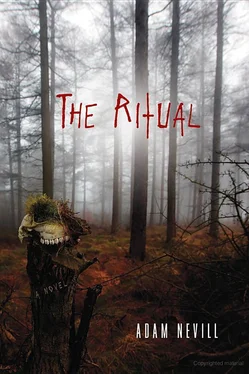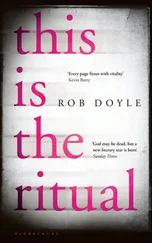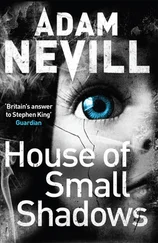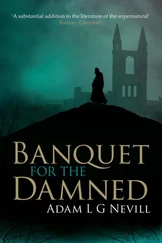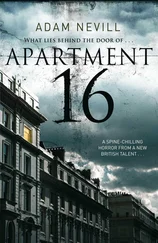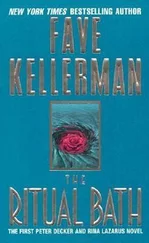There was a pantry. Dark and brown and cool inside. A chunk of black bread he snapped from the hard loaf and crammed it to his mouth. Sucked it more than chewed it. Coarse against his tongue, it tasted of blood. There was a salted joint of meat in there; two sacks of beets; jars full of pickles and preserves lined four long shelves; dusty cooking apples; salt. Turnips, carrots, ancient coffee. But nothing to go. Blood Frenzy must have arrived empty-handed; these were her meagre provisions. They’d come to the end of the earth for this. Later, he could eat later. When he was gone.
Keys, keys, fucking keys.
He went up the stairs slowly, backwards, trying to keep the chewing mouth in his hip closed. He needed to wash it, bind it. At the top of the staircase, he turned himself around. Sent the barrel of the gun into the murk first and followed it with his body. He wondered if Surtr could have come back inside the house and crept up here. He dismissed the idea, but felt tense and brittle, like he would shatter at the first sound of her still being around.
Down the corridor. A peek into the first room. Two sleeping bags on the floor. One blue, one yellow. Loki and Surtr’s room. Clothes strewn everywhere. Untidy, dirty, angry people. He went inside, looking for Loki’s jacket. Then turned and gasped. Nearly shot from the hip, when he saw the three animal masks they had worn that first day. All three were lined up and staring from a wooden sawbuck table that looked as if the Vikings had made it. Did they bring the animal heads here, or had they come with the room?
A miasma of sweat and hair grease wafted off their clothing. In the mess on the floor he found a leather biker jacket. It was riddled with spikes around the shoulders; riveted with steel at the waistline and elbows. Celtic Frost, Satyricon, Gorgoroth, Behemoth, Ov Hell, Mayhem, Blood Frenzy, painted carefully in white paint on the back panel. Inside a pocket, a jingle-jangle. Six keys, attached to an inverted steel crucifix: what else?
For some reason Luke zipped the pocket closed after extracting the keys, then asked himself, ‘Why?’ Shook his head. It was like walking through treacle now. Was the house so hot? He could only remember being cold in here before. The building listed like a boat in a squall. The rifle was so heavy; the barrel banged against things. He swore at it. His face was burning, wet.
Back outside in the corridor, he glanced past his old room and at the little door that led to the attic staircase. Listened. A voice. He frowned. Moved down to the door, but it grew faint. He looked at the ceiling. Realized the voice was not coming from up there, but from outside. Someone was singing .
He went back into Loki and Surtr’s room and peered down through the dirty glass of the window. Nothing out back in the orchard. He paused, listened again. It was coming from the other side of the house. Unable to bear going back inside the room they had kept him locked inside, he descended the stairs, breathless, dazed, his wounds burning but wet.
In the hallway, he raised the rifle butt to his shoulder and walked at the front door. The parlour door was still closed; the kitchen, he saw after a quick sweep with his jerky eyes, was empty. Back door was still open.
He stepped over Loki, looked outside.
The little old woman stood by the site of the second fire, just beyond the radius of scorched grass. A tiny figure dressed in black to her neck, facing the trees, indifferent to the motionless body of Fenris on her lawn. For such a small person, her voice carried. The wailing that came out of her was almost Arabic in intonation, but then Luke thought of North American Indians too. And whatever she sang lilted up and down in the singsong cadences of Swedish. She clapped out a beat with her little hands. What she sang was simple, repetitive, like a nursery rhyme. The same few lines, going up and down, over and over. He began to recognize one word. ‘Moder.’
She called it out again, and again, at the end of the third line of the three-line verse: ‘Moder.’
Mother.
‘No,’ he said to himself. ‘Please no.’
The realization came quick and cold like the contents of a pail of freezing water thrown straight into his face. He swung his head like a tired horse, and knew that no man should be made to witness such things. Was he in hell? Had he died in that forest with his friends, and now this was an endless narrative of atrocity in an afterlife he stumbled about in?
He looped the keyring around his little finger, took aim with the rifle. ‘Ma’am! I said no!’
She sang like a child, like a little girl, and raised her thin dusty arms into the air. She looked at the sky and called the old name.
When the time comes, will you sing with us?
He had suspected once or twice that she had been using him, but he had not dared acknowledge it. It seemed too improbable, too incongruous for such a small freakish lady who made stew and clomped about the hovel in her homespun gown. But she had used him. Yes, to get the unwanted guests out of her house, to have her uninvited visitors bleed out on the lawn. They came and they invited themselves inside and made demands and would not leave. She was old and she wanted help ridding her home of the rodents. Fenris was a weasel and she wanted his neck wrung like a dish cloth; he had seen it in her black eyes. So she let him remain alive for a while, so Blood Frenzy thought they were in charge and that she was working for them, serving their purpose up here; but then she let the sacrifice be free to accomplish some chores for her. He’d survived the forest and Blood Frenzy because he had work to do for her; he was the angry one, the violent one. In the party of four that came through here to die, he was the man not so different to the youths with the painted faces, the man who could be useful, for a while. He had always felt his fate out here was predetermined. That he had a purpose. And this was it.
She’d played him from day one, but he was still to be given, and taken away out there, to the rocks and boughs and waters and the ways of prehistory. Now his job was done, the little old child was calling mother home. Because he was still a sacrifice. And he was even dressed for it. She had laid out the robe and crown for him to wear.
‘God no.’
He aimed the shaky rifle sight between the shoulder blades of that tiny figure. And let the sights twitch and hover about the target.
All of these things should not be. He thought of Hutch, pale and bedraggled and naked and hanging between spruce branches. He remembered Dom’s arms about his own shoulders not long before he too was opened and emptied like a rabbit by a hunter. He thought of poor Phil, all tatty and looted, the hood of his waterproof still up and keeping his pale face dry in death. And he remembered the sound of thin brown bodies, twitching in the darkness of an attic that should not exist. He bit down on horror. Clenched his jaw against the horror of it all. And squeezed the trigger.
Like a hand shoving her in the back, the little old lady made a surprised sound like all the air had been pushed out of her in one go. And up she went, off her feet, then came immediately straight down, onto her face. She never moved again. He’d shot out her tiny heart.
The world went silent and still. The whole forest held its breath. The sky paused in its gaseous swirling. The birds closed their beaks and the animals lay down their heads.
Luke walked across to her and looked down.
The hem of her dusty dress was hiked up to her bony knees. Unclothed, her legs were thin and covered in coarse white hair. The skin through the hair was pinkish. Her legs bent the wrong way at the knee joints. At the end of her goatish legs were little white hooves. Her tiny loud feet.
Читать дальше
